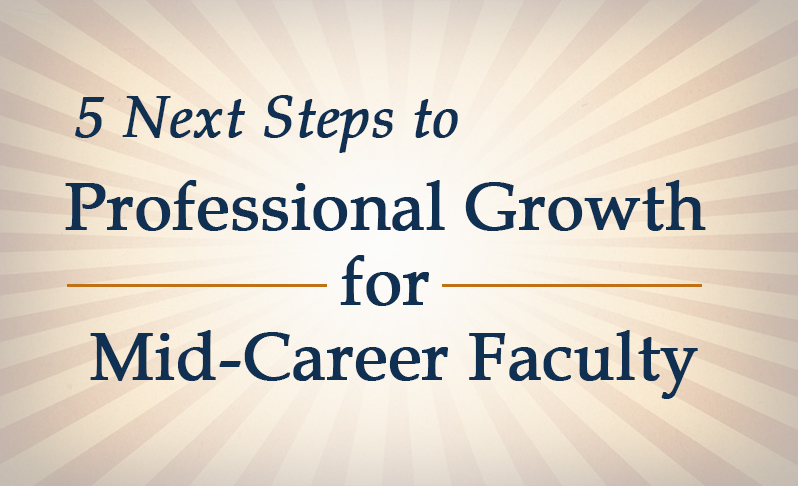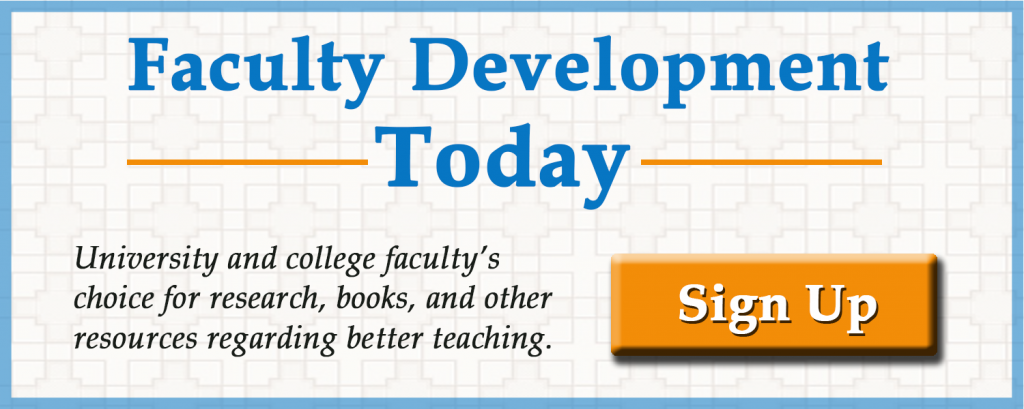Nationwide, over half of higher education faculty are mid-career. While they play vital roles sustaining their institutions, relatively little systematic attention has been paid to meeting their particular needs. (Tweet this quote.) In a paper to be published in the January issue of The Journal of Faculty Development, we describe a professional renewal retreat program tailored to this “keystone” group of faculty. Detailed analyses of reflections of 47 retreat participants before, during and after the program were presented and discussed in the article.
The reflections provided by our retreat participants point to the value of a career-stage-specific professional growth and renewal opportunity, and suggest several “next-steps” for faculty developers.
The 5 “Next Steps”
- Offer mid-career specific professional renewal programs that acknowledge their unique needs. Our program participants welcomed the opportunity to spend the day with peers engaged in activities and conversation tailored to their particular career-stage. The commonalities inherent in their status as mid-career faculty notwithstanding, it was clear that the participants differed in important ways in why they wanted to attend and in what they gained from the experience. Our campus now offers a number of professional development events specifically designed for this cohort of our faculty, to support them in their efforts to identify specific goals and aspirations, to develop requisite skills, to (re)engage with their professional colleagues on and beyond the campus, and to strike a personally satisfying work-life balance.
- Promote collegial interaction. Our program participants, particularly women and faculty of color, voiced strong desires to engage in more frequent and more sustained collegial interactions, either as a reason for attending the retreat in the first place, or as an insight gleaned from the experience. Numerous studies completed over the past several decades have documented the link between opportunities to establish close relationships with colleagues and more fruitful scholarship, and greater job satisfaction and motivation. Our Center for Faculty Development has launched a strand of “Collegial Conversation” series, to encourage faculty to interact in a variety of formal and informal settings. The Center also has established two very popular “communal” programs to support faculty scholarship where faculty work on their individual projects but in a group setting.
- Promote opportunities to “give back.” A sizable proportion of participants expressed a desire to mentor junior faculty. These sentiments are consistent with the sense of personal satisfaction and professional rejuvenation that several studies have documented among seasoned faculty working with junior colleagues. Such a goal of wanting to become more engaged in supporting the “next generation” is emblematic of the striving for a sense of “generativity.” We have created a number of opportunities for mid-career faculty to develop requisite skills in this area, and to assume leadership roles in a variety of faculty learning communities.
- Acknowledge and meet the needs of women faculty and faculty of color. The comments and insights shared by our program participants are consistent with findings reported repeatedly in the literature: while many faculty appreciate positive collegial work climates, the morale and productivity of female faculty and faculty of color are particularly responsive to personally and professionally supportive interpersonal relationships. Our Center for Faculty Development is in its second year of sponsorship of a seminar series showcasing the scholarship of our campus’s female faculty. These sessions, attended predominantly by female faculty, have proven to be effective venues for nurturing professional collaborations and sustained conversations among participants.
- Campus administrators must step up to the plate … but so too must the faculty themselves. We urge department chairs and other academic administrators to become more aware of the ways in which they might facilitate faculty interaction, motivation and productivity. We must remember that faculty care and feeding is required. It’s easy to fall into thinking that once a faculty member has tenure, he or she doesn’t need much more attention, which is clearly not true. Many researchers have argued that failure to find mechanisms for ensuring the continued effectiveness of their tenured faculty can jeopardize the very essence of university vitality. Providing mentoring for mid-career faculty is a way to prevent them from feeling isolated or alienated and of encouraging their professional engagement and investment in departmental activities. (Tweet this quote.)
Faculty members themselves, however, must take a proactive role as well. It is perhaps an obvious fact about life in the academy – for most tenure-line faculty, the agenda for the first few years is fairly well set for them, as they move through the process of tenure and promotion. Having achieved those significant milestones, future goals need to be set by them. Mid-career faculty should be provided with the contexts in which and the tools with which to engage in the reflection and planning needed to support their continued professional growth, but the ultimate responsibility rests with each individual faculty member.
Receive the Full Article
You may receive the full article from which this blog post was based and other articles by signing up for our free Faculty Development Today Newsletter.
Authors
Amy Strage is currently Assistant Vice President for Faculty Development and Director of the campus Center for Faculty Development. Prior to assuming this position, she was Professor of Child and Adolescent Development. In addition to her focus on mid-career faculty, her recent research addresses the needs of graduate students preparing for academic positions as well as those of senior faculty preparing to make the transition to retirement. She has co-directed two ACE/Sloan (American Council on Education/Alfred P. Sloan Foundation) awards to San José State University.
Joan Merdinger is the former Associate Vice President for Faculty Affairs and Professor Emerita of Social Work at San José State University. She is currently President of the campus Emeritus and Retired Faculty Association. She has co-directed two ACE/Sloan (American Council on Education/Alfred P. Sloan Foundation) awards to San José State University.



